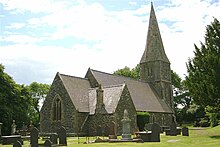St Caffo's Church, Llangaffo
| St Caffo's Church, Llangaffo | |
|---|---|

The church from the north-east
|
|
|
Location in Anglesey
|
|
| Coordinates: 53°11′28″N 4°19′38″W / 53.191060°N 4.327121°W | |
| OS grid reference | SH 446 685 |
| Location | Llangaffo, Anglesey |
| Country | Wales, United Kingdom |
| Denomination | Church in Wales |
| Website | Church website |
| History | |
| Founded | 1846 (present building) |
| Dedication | St Caffo |
| Architecture | |
| Status | Church |
| Functional status | Active |
| Heritage designation | Grade II |
| Designated | 30 January 1968 |
| Architect(s) | Weightman and Hadfield (Sheffield) |
| Style | Early English |
| Specifications | |
| Materials | Rubble masonry, slate roof |
| Administration | |
| Parish | Llanfihangel Ysgeifiog (Gaerwen) with Llangristiolus with Llanffinan with Llangaffo |
| Deanery | Tindaethwy and Menai |
| Archdeaconry | Bangor |
| Diocese | Diocese of Bangor |
| Province | Province of Wales |
| Clergy | |
| Vicar(s) | The Reverend E C Williams |
| Curate(s) | The Reverend E R Roberts |
St Caffo's Church, Llangaffo is a 19th-century church, in the south of Anglesey, north Wales, about 5 miles (8.0 km) from the county town, Llangefni. It was constructed in 1846 to replace the previous medieval church in the village of Llangaffo. The new building includes a number of monuments from the old church, and has a spire which is a prominent local landmark. The churchyard has part of a stone cross dating from the 9th or 10th century, and some gravestones from the 9th to 11th centuries. It is dedicated to St Caffo, a 6th-century martyr who was killed in the vicinity.
The church is still in use as part of the Church in Wales, one of four churches in a combined parish. It is a Grade II listed building, a designation given to "buildings of special interest, which warrant every effort being made to preserve them", in particular because it is regarded as "a mid 19th-century rural church, consistently articulated and detailed in an Early English style".
The date of first construction of a church in Llangaffo (a village in Anglesey about 5 miles (8.0 km) south of the county town of Llangefni) is uncertain. The village takes its name from the church: the Welsh word llan originally meant "enclosure" and then "church", and "-gaffo" is a modified form of the saint's name.St Caffo, a 6th-century Christian, was a companion of St Cybi and was martyred by shepherds in the vicinity of what is now Llangaffo, perhaps in revenge for his brother Gildas insulting Maelgwn Gwynedd, the local ruler. It is thought that there may have at one point been a monastery in this location, known as "Merthyr Caffo": merthyr is the Welsh word for "martyr", and in place names means a building erected near a saint's grave.
The present building, which is in the north-eastern part of the village on the south-eastern side of the B4419 road, was erected in 1846 alongside the churchyard to a design by the Sheffield-based architects Weightman and Hadfield. It replaced an older church, which had stood on an adjoining outcrop of rock until it was demolished. It was described by the clergyman and antiquarian Harry Longueville Jones (writing in 1846, as the new church was being constructed) as a "very small and unimportant edifice"; he also noted that it was the only medieval building remaining in the parish.
...
Wikipedia

